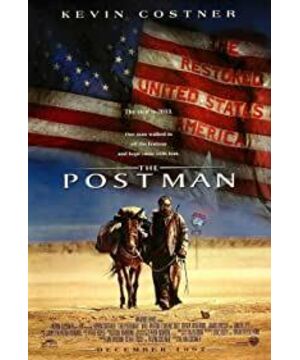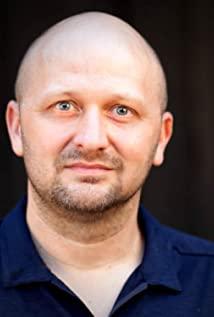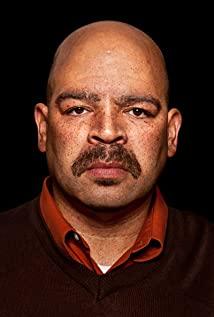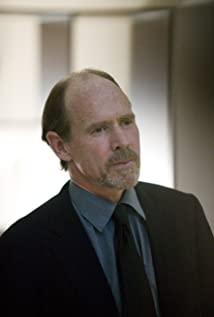This film is also called "Ultimate Postman" because it took place in 2013 and the story lasted until 2043. It said that after the world war, without the United States, Europe would be fragmented, and there was no mention of Asia.
On the old land of the United States, there are only a few settlements that exist as small towns. The "actor" played by Kevin Costner wanders these settlements in Shakespeare's plays, because a certain pre-war photocopier salesman After the war, he became a "general" and changed his original path of survival.
In order to survive, this "actor" successfully escaped the hunt of the "general" and the lion's mouth, and borrowed a set of clothes from the dead postman's body to play a postman.
In order to survive, when he entered the first small village, he used those letters that were originally disguised. Then, he successfully entered the town because of a mail that he carried with him. He became a man who brought all the disturbed people. The messenger of the hope for the restoration of the United States; even more so because of the policies and regulations of the rebuilt US government that he compiled, igniting the "American dream" that carries people's hearts.
Therefore, the young Fodder followed this "American Dream" and became the head of the small town post office, and began the transmission of this "American Dream"—the message of the restoration of the United States. At the same time, the actor played the "postman". Because the young Buddha recruited soldiers and bought horses, he was portrayed by word of mouth as a hero who had a close relationship with the restored president.
An artificial hero is like the resurgent America created by this actor. Is it a lie? It is a lie, just like the copier salesman who forced the actor into a postman successfully portrayed himself as a general. In fact, when the actor did not know that he had become a "hero", he was lazily hiding in the mountains, too lazy to say that he would not get out of bed to eat horse broth.
Indeed, as an actor, his inner world is to live a peaceful life. Even if he reunited with Buddha because he met Buddha’s young postman, he just wanted to give a woman who was pregnant with his child. A safe place to give birth. Even though he was deeply dissatisfied with the evil deeds of the "general", he never thought of rebelling against the general. For this reason, he even forged the letter of the so-called restoration of the US President and disbanded the post office; even if he had been portrayed as a A "hero", he still went incognito to find the "peaceful" place he wanted to go. I forgot the English name. In short, it is an "ideal country".
However, the fire of hope is just like what Grandpa Mao said, "a single spark can start a prairie fire". Once it is ignited by him, it cannot be controlled and spread across the entire land. When the "general" is ignited by the "American Dream" The resistance of the people, he knew that his so-called "Emperor Dream" was about to become a bubble. He wanted to declare war on the hero "The Postman". He killed ten people in each village to force the "Postman" to come out to fight against him. However, the postman did not come out for a decisive battle, only those who were slaughtered called "Postman, keep going" before they died.
"A hero is accomplished by another hero," the general said in the finale. However, the "postman" did not choose a decisive battle in the form of group fights. Instead, he chose the rules of the game that was originally a "general"-to be the boss, he must defeat me, showing the mark of the "general" branded on his arm, which means one After challenging a place, the "general" knew that he was facing the actor he called "Shakespeare".
Of course justice triumphs over evil. However, the "general" stained with the blood of countless innocent people did not die under the hands of the actors, nor did he die by the Buddha who called the "general" rule eight of the game rules-"unnecessary sin must die" In the hands of De, it was because the actor still wanted to use the laws of the "American Dream" to change into a "peaceful" world. The actor wanted to use the laws of the new world to convict him, but the general still grabbed the gun and wanted to eliminate it. The "actor" whose "imperial dream" was shattered. However, the general eventually died in his own hands because of "multiple acts of unrighteousness will kill himself."
Martin Luther King has a famous saying-I have a dream. "American Dream" is very interesting to say. Many films with political preaching in the United States are actually quite tender. In other words, I like to write about small people who have never thought of becoming heroes and become heroes.
The "actor" in the film is very "minimist". He raised the white flag twice in the film, the first time he negotiated for the town, and the second time he took a large team to a decisive battle. They all held up the white flag and chose to negotiate "compromise" first. He even told the general that the war ended in the hands of the people who started the war. In the film, he was constantly pushed away because of his survival. At first he was threatened with death everywhere. After that, he was moved by the resistance of a woman. Later, it was the responsibility of being portrayed as a hero. Finally, he had to be innocent. His life assumes the responsibility of a "hero".
Kevin Costner's film is not very popular. I also found out when I watched PPS. I originally wanted to watch a science fiction film, but in the end, I can only say that I watched a nondescript overhead film.
After reading it, I suddenly started to want to write a record with some playfulness.
In the era of Plato, the "ideal country" was an "American dream"; in Franklin's era, anyone who had read the history of the world knew what the "American dream" represented; Martin Luther King also had an "American dream." This paid the price of life; some of my classmates also flew to the other side of the ocean with their "American Dream". and many more.
Do you have the American dream in your heart?
I, "I have a dream", if you understand me, I think you can smile silently.
View more about The Postman reviews











